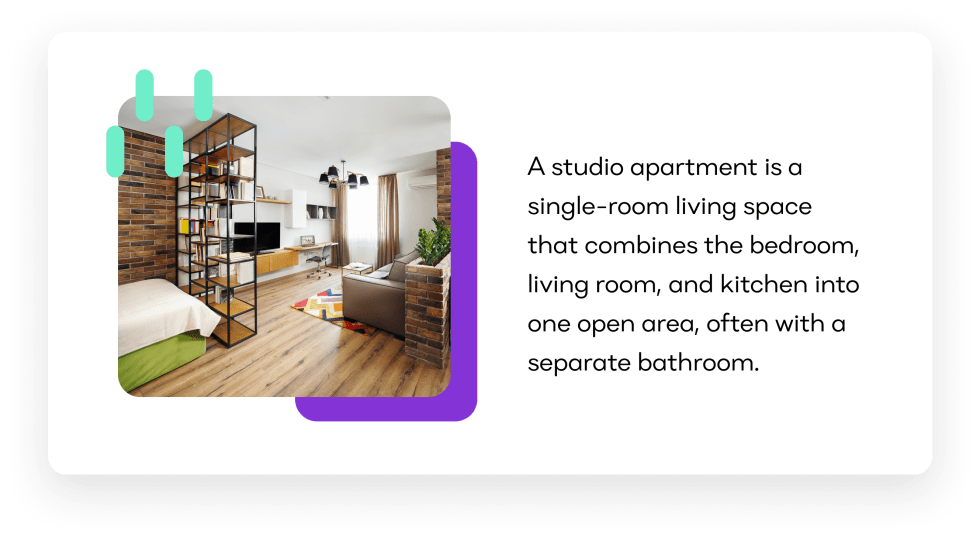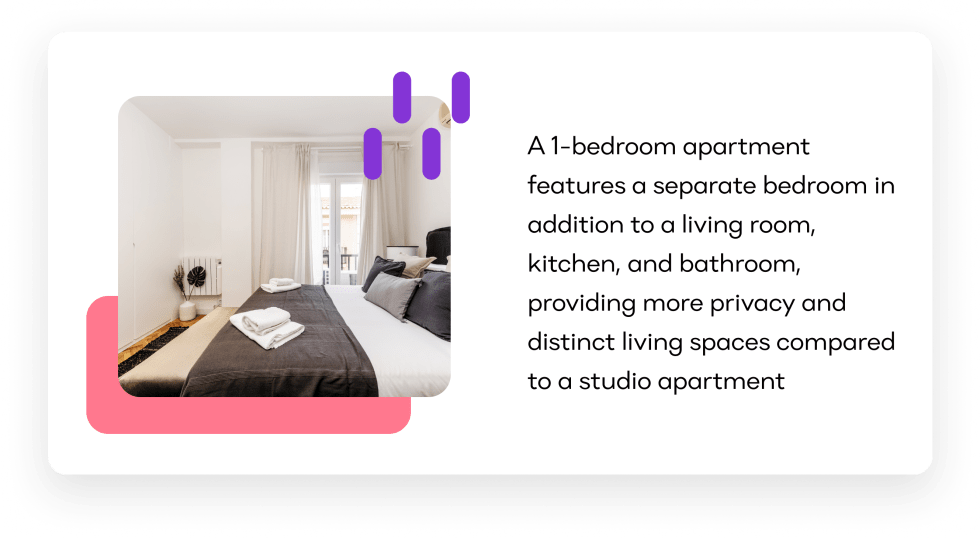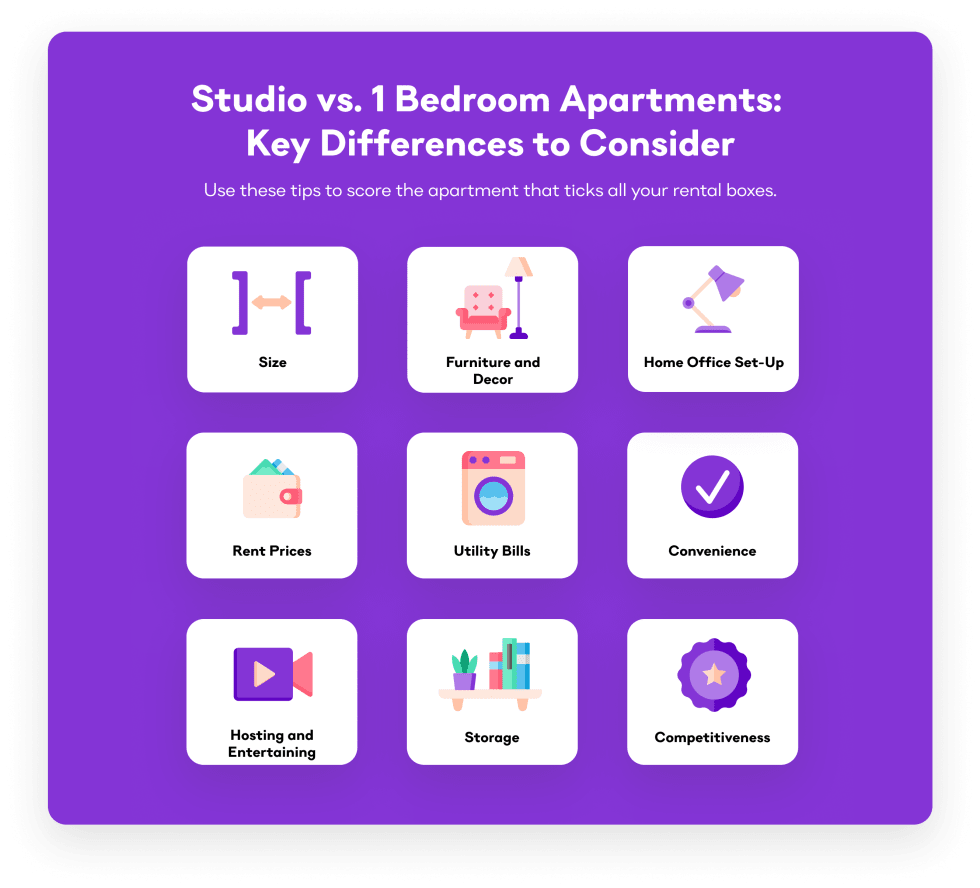- 46 units available
- 1 bed • 2 bed • 3 bed
- Amenities
In unit laundry, Hardwood floors, Dishwasher, 24hr maintenance, Stainless steel, Walk in closets + more

A studio apartment combines your bedroom, living area, and kitchen into one open space. A one-bedroom apartment has a separate bedroom, offering more privacy and storage. Studios are generally cheaper and easier to maintain, while one-bedrooms provide more room for couples, remote workers, and renters who value entertaining space.
The right choice depends on your budget, lifestyle, and space needs. Here’s what to know before you sign your next lease.
The main difference comes down to layout and separation of space:
A studio is a compact, open-concept apartment where your bed, couch, and kitchen share the same space. Renters often divide the room using furniture, screens, or shelving.
Best for: budget-conscious renters, students, and solo dwellers who want to live in pricier neighborhoods without the higher rent of a one-bedroom.

A one-bedroom features a private sleeping area apart from the living space. Depending on the size, you may also get a dining nook, larger kitchen, or extra closets.
Best for: couples, remote workers, or anyone who needs more privacy, storage, and flexibility than a studio provides.

Before you start apartment hunting, it can be helpful to brush up on the differences between studios and one-bedroom apartments to find the right place for you.
| Feature | Studio | One-Bedroom |
|---|---|---|
| Size | ~300 to 600 sq. ft. | ~500 to 700+ sq. ft. |
| Privacy | Minimal (all-in-one space) | High (separate rooms) |
| Rent | Lower | Higher |
| Utilities | Cheaper | More Expensive |
| Storage | Limited | More Closets / Storage |
| Best For | Solo renters, students, and budget-conscious | Couple, WFH renters, entertainers |
Studio apartments are often smaller than one-bedrooms. However, that isn't always the case. You can sometimes find larger studio apartments that are more affordable than one-bedrooms in your area, which can be a great opportunity if you don't mind the open concept of the studio.
Of course, a cozy apartment isn’t a good fit for everyone. You may crave more space and dimension or risk feeling stir-crazy. Plus, if you’re living with a significant other and desire privacy, you’re better off in a one-bedroom apartment. It’s roomy enough for a couple and offers the opportunity to split the rent and save money.
If you love interior decorating, a studio apartment offers limited options. Your focus will likely revolve around creating more divisions, like screen dividers or plants. You also won’t have many opportunities to hang artwork or add interesting pieces of furniture.
But if you’re on a budget and don’t want to bother with too much stuff, a studio apartment is a great option. Unlike a one-bedroom, you won’t need much furniture or decor to make your place feel like home.
It’s true you can work from home in both a studio apartment or a one-bedroom apartment. However, it’s not always practical or comfortable to eat, sleep, work, and relax in the same room day in and day out. Sometimes studio apartments just don’t offer the flexibility you need for your work-life balance.
A one-bedroom is roomier for a remote career, and it’s also easier to set up a work-from-home office in your apartment. An alcove, small den, or spacious corner is about all you need.
Rent for a studio apartment is usually less than other apartments on the market. You can save more money living in a studio apartment, or even move into your dream neighborhood.
Even if you’re not looking to save money, a studio apartment offers a more efficient and environmentally-friendly lifestyle. You’ll use less energy, cleaning products, water, and overall day-to-day resources living in a studio apartment.
Keep in mind that not all studio apartments are cheaper than a one-bedroom. Living in a trendy neighborhood in an upscale neighborhood commands a high price tag, no matter the apartment size you choose.
It’s normal for utilities to be less expensive in a studio apartment. It takes less heat and air conditioning to keep your place feeling comfortable.
Meanwhile, a one-bedroom apartment requires more energy to keep it feeling temperate and comfortable. If you have high ceilings or a lofted area, you’ll spend even more on heating and cooling.
Multitasking is a way of life, and it’s easy to do in a studio apartment. You can watch Netflix, clean, and cook dinner in the same room. Your place is also faster to tidy up before heading out for a night on the town.
Studio apartments are a good option if you're looking for an affordable spot in a busy downtown area so you can get everywhere you need quickly.
When you live in a studio apartment, your bed may also serve as part of the seating area. That means guests are constantly surrounded by your personal effects and don’t have much room to spread out. It’s not impossible, but difficult to entertain a crowd when you live in a studio apartment.
Hosting out-of-town guests is also difficult. You’ll likely have a blow-up mattress adjacent to your own bed to fit your guest.
You may not have a dedicated guest room in a one-bedroom apartment, but there’s still room to host people while enjoying some privacy. You can set up the couch or an air mattress in the living room or a small den. Beyond overnights, a kitchen and living room are usually all you need to host a dinner party or gathering over drinks and snacks.
One of the big challenges of living in a studio apartment is the lack of storage space. If you love collecting shoes or jackets, a studio apartment probably won’t work for you. They usually come with limited closet space that hangs a handful of coats.
If you decide to choose a studio, you’ll probably need a wardrobe, dresser, or innovative clothing storage solution to make it work. You may also want to invest in additional shelves or other storage solutions to keep your place tidy.
Although you can find one-bedroom apartments just about anywhere, they’re also more competitive to secure in cities like New York City and Boston. Studios are generally less desirable, and you’ll face a sea of renters vying for the same 1-bedroom apartment that you are.
Rent prices vary widely by city. On average, studios are about 5% cheaper than one-bedrooms, but in hot markets, the difference may be small—or even reversed.
Below, we’ve listed the studio apartment prices in a few popular cities in the US: Austin, Boston, Chicago, Los Angeles, New York, Philadelphia, San Francisco, and Seattle.
| City | Studio | One-Bedroom |
|---|---|---|
| Austin, TX | $1,265 | $1,489 |
| Boston, MA | $3,010 | $3,484 |
| Chicago, IL | $1,889 | $2,335 |
| Los Angeles, CA | $2,222 | $2,520 |
| New York, NY | $3,928 | $5,187 |
| Philadelphia, PA | $1,584 | $2,077 |
| San Francisco, CA | $2,720 | $3,568 |
| Seattle, WA | $2,395 | $3,561 |
If privacy and flexibility matter most, a 1-bedroom is worth the higher price.
If predictable bills are a priority, studios are more budget-friendly.
Choose a studio if:
Choose a one-bedroom if:

Two people can live comfortably in a one-bedroom apartment. A baby or toddler can also fit in a one-bedroom with two adult parents. However, most leases set limits on how many people can live in a space, so make sure to check your rental agreement.
In most cases, two people can share a studio apartment, but it may feel cramped. Check your lease or ask your landlord about occupancy guidelines before bringing in a roommate, however.
While you cannot add walls to your studio apartment, clever use of decor can create more separation between your kitchen and bedroom spaces, even allowing you to carve out a living room. Tall shelving units, room dividers, canopy beds, and even the placement of furniture can all contribute to the feeling of distinction between areas.
The low price point combined with the simplicity of living in a studio make them very attractive rental units, especially to students and younger renters without families. They also often allow tenants to live affordably in areas that are otherwise out of their price range.
Most one-bedroom apartments are probably between 500 and 700 square feet. Anything upwards of 700 square feet is usually considered a large one-bedroom apartment.
Not always. In competitive areas, studios may rent for nearly the same price or more than a one-bedroom.
Generally, yes. Smaller spaces mean lower heating, cooling, and electricity costs.
A one-bedroom is likely better for couples. The separate space provides privacy, storage, and flexibility that couples usually need.





In unit laundry, Hardwood floors, Dishwasher, 24hr maintenance, Stainless steel, Walk in closets + more
In unit laundry, Granite counters, Pet friendly, Stainless steel, Walk in closets, Gym + more